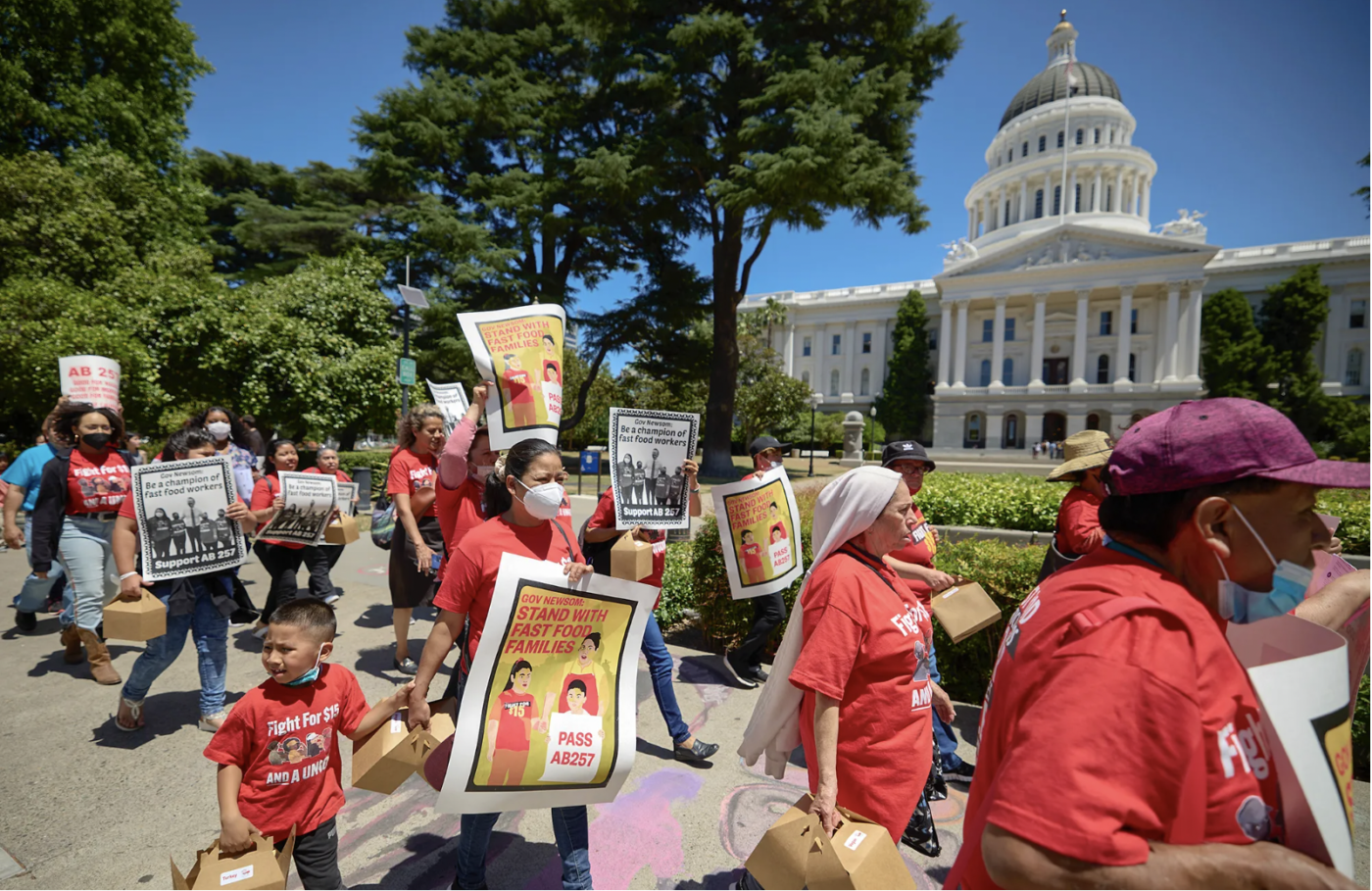The California Legislature finished its 2023 session late Thursday night, but not before lots of lobbying by advocacy groups, some controversy and quite a bit of last-minute deal-making.
The most significant agreements are also big wins for Big Labor — and defeats for Big Business — as CalMatters state Capitol reporters Alexei Koseff and Sameea Kamal explain.
While one Republican senator complained that “the fourth branch of government in this Capitol building has a little bit too much power this year,” the head of the California Labor Federation said unions have worked hard over the past few years to elect new members who champion workers’ rights.
Though some expect that the business-labor balance will eventually swing back to the middle, it’s clear that unions had the upper hand this session. Lawmakers sent to Gov. Gavin Newsom:
- Striking workers: A bill that is one of the California Labor Federation’s top priorities, to allow striking workers to collect unemployment benefits after two weeks on the picket line, is especially notable this summer, when labor disputes involving California screenwriters, hotel workers, restaurant employees, and others are leaving many without pay as they strike for better working conditions. But business groups oppose Senate Bill 799, arguing that the state’s unemployment program is already overstrained.
- Health care employees: An agreement to eventually raise the minimum wage to $25 an hour for tens of thousands of health care workers. In exchange, under SB 525, hospitals and other medical employers get a 10-year moratorium on local measures to increase compensation. Workers at larger hospitals and dialysis clinics would be the first to see the increase, starting in 2026, followed by community clinics and other health facilities. Employees at smaller and rural hospitals will have to wait until 2033 to see the $25 bump.
- Fast food restaurants: A deal between fast food companies, unions and lawmakers, detailed in AB 1228. As unveiled on Monday, the agreement would give a $20 minimum wage to fast food workers starting next April. And fast food companies wouldn’t face potential liability for labor violations at their franchises. A ballot referendum to undo a controversial law regulating the industry would also be nixed, saving both sides the time and money on the campaign. SEIU California called the fast food bill “one of the biggest wins in history for working people.”
While those labor bills were among the most closely-watched on the final day and night, legislators gave final approval to dozens more. CalMatters is tracking key bills that are being sent to Newsom.
Here are some other noteworthy bills that made it over the finish line in the final days:
- SJR 7, Gov. Newsom’s resolution calling for a federal constitutional convention to address gun violence.
- SB 478, by Sens. Bill Dodd and Nancy Skinner, would ban “junk fees” — hidden charges on concert tickets, hotel rooms and other online purchases.
- SB 519, by Senate President Pro Tem Toni Atkins, to reduce jail deaths by adding a position on the state panel that oversees county jails and by making public internal reports on deaths.
- AB 37, by Assemblymember Mia Bonta, to allow candidates to use campaign funds for home security and bodyguards, to remove a $5,000 limit on those expenses, and to continue the security after officials leave office if there’s still a threat.
- AB 249, by Assemblymember Chris Holden, to mandate lead testing at all school water fountains and faucets that haven’t yet been tested.
- AB 446, by Assemblymember Sharon Quirk-Silva, to require that cursive writing be taught in first to sixth grade. (No surprise: She’s a former teacher.)
- AB 607 by Assemblymembers Ash Kalra and Sabrina Cervantes, to require the University of California, California State University, and California Community Colleges to prominently display the cost of course materials.
- AB 645, by Assemblymembers Laura Friedman, Miguel Santiago, and Phil Ting, would test speeding cameras in Glendale, Long Beach, Los Angeles, Oakland, and San Francisco.
- AB 716, by Assemblymember Tasha Boerner, to end surprise ambulance billing by requiring reports on maximum rates and charging patients the same rates regardless of provider.
- AB 800, by Assemblymember Liz Ortega, would require public schools to tell students about worker rights the week of April 28 each year.
- AB 1060, also by Ortega, would require insurers to cover over-the-counter Narcan once federal regulators give approval and starting in 2025.
- AB 1536, by Assemblymember Juan Carrillo, would make undocumented individuals who are blind, disabled, or older than 65 eligible for $1,100 to $1,900 a month in state aid.
Not every bill made it, however. For instance, AB 518, by Assemblymember Buffy Wicks, would have extended who can take paid family leave to “chosen family” who don’t have a legal or biological relationship. The measure was held in the Senate. And SB 50, by Sen. Steven Bradford, to prevent “pretextual” traffic stops that target people of color, was held in the Assembly.
CalMatters covers the Capitol: CalMatters has guides to keep track of your lawmakers, explore the Legislature’s record diversity, make your voice heard, understand how state government works and to find out what Gov. Newsom decides on key bills.
